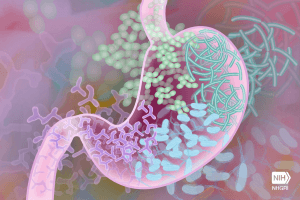Parkinson’s disease and the gut microbiome. Two seemingly different topics are actually more related than meets the eye.
Parkinson’s disease is a neurodegenerative disorder that effects dopamine-producing neurons in the brain. Physical effects of Parkinson’s include tremors, bradykinesia, and limb rigidity. Even though Parkinson’s is the 14th leading cause of death in the United States, the cause and cure remain largely unknown.
However, a recent study done at the University of Alabama at Birmingham has discovered that there is a link between Parkinson’s disease and the bacteria in the gut microbiome. The gut microbiome contains tens of trillions of microorganisms that are apart of our immune system and metabolism. Approximately one third of the bacteria are common to most people, while the remaining two thirds are specific to oneself and their body. These organisms serve as our own “identity card” that makes us unique. Haydeh Payami, Ph.D., professor in the Department of Neurology in the University of Alabama at Birmingham School of Medicine who lead the study remarked that “the collective genomes of the microorganisms in the gut is more than 100 times larger than the number of genes in the human genome. We know that a well-balanced gut microbiota is critical for maintaining general health, and alterations in the composition of gut microbiota have been linked to a range of disorders.” More specifically, the microbiome helps rid the body of xenobiotics, or chemicals not naturally found in the body often arising from environmental pollutants.
Payami concluded that the research “showed major disruption of the normal microbiome … in individuals with Parkinson’s.” The study followed 197 patients with Parkinson’s from three distinct regions in the United States: New York, Atlanta, and Seattle. Research indicated that patients living in different regions had different gut imbalances, which may reflect the environmental, lifestyle and diet differences between the locations. The study also found that certain medicines used to treat Parkinson’s interact with the gut microbiome differently. It was also noted that the bacteria responsible for removing the aforementioned xenobiotics was different in individuals with Parkinson’s. However, it is still unclear whether Parkinson’s causes changes in an individual’s gut microbiome, or if changes in the microbiome are an early warning sign of the disease.
The human gut microbiome from this source
Research between the gut microbiome and Parkinson’s is relatively new, so there are no concrete findings or cures yet. Fortunately, this study may hold information for assessing the efficiency or toxicity of medication for the disease by examining its effects in the microbiome. As someone whose relative battled Parkinson’s, I have firsthand witnessed the effects of this terrible disease. It is reassuring to see that there is new research being done every day to eventually find a cure, but in the meantime making the lives of those fighting Parkinson’s easier. As Payami said, “This opens up new horizons, a totally new frontier.”
To read the full study, click here. What do you think: Does Parkinson’s disease change the microbiome or is a change in the microbiome an early indicator of the disease?



Leave a Reply